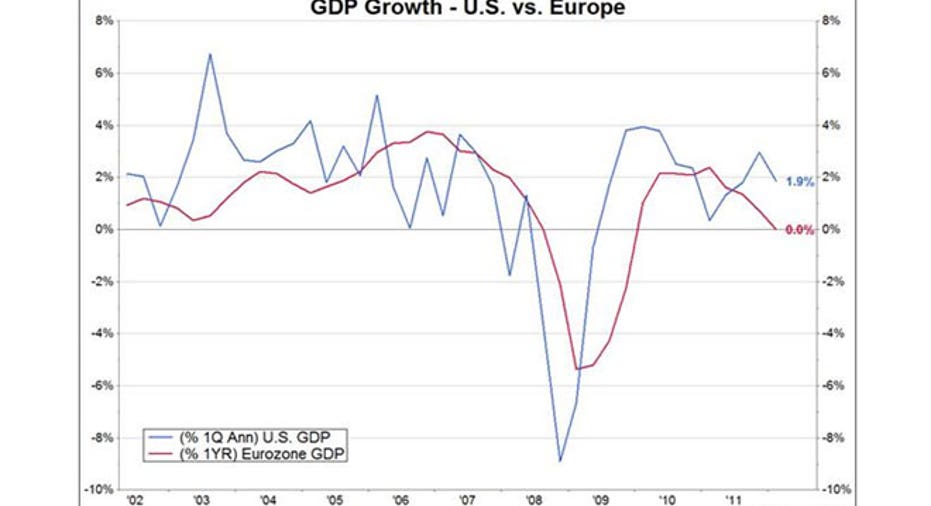Dreary Data Fuel U.S., Eurozone Decoupling Doubts

Last week new evidence emerged signaling the U.S. economy may be suffering from a eurozone-fueled slowdown, setting off alarm bells in the investing community.
These data points, headlined by a plunge in the pace of job growth for May, also appear to have blown a massive hole in the thinking that the domestic and global economies would be strong enough to decouple from that of battle-scarred Europe and its never-ending debt soap opera.
“We were not a big believer in decoupling,” said Bruce McCain, chief investment strategist at KeyCorp.’s (NYSE:KEY) Key Private Bank, pointing to the “anemic growth” the U.S. economy has been limping around with.
“When you’re in your twenties you can take exposure to ailments from the general population. But when you’re older and your system isn’t as resilient, you can’t overcome it as well,” said McCain. “The U.S., if not geriatric, is at a point where its resistance is a lot lower than other times in our history.”
Throwing Cold Water on Decoupling
Fears about the fallout of the eurozone debt crisis appear to be rattling the U.S. economy.
Last week alone investors learned payroll and manufacturing growth slowed in May, while consumer confidence slipped to a four-month low and pending home sales unexpectedly slumped in April.
“Last week’s flood of weaker-than-expected global economic indicators derailed the notion that the global economy might remain decoupled from Europe’s recession,” Ed Yardeni, president of Yardeni Research, wrote in a note on Monday.
All of this has triggered yet another round of speculation that the U.S. could succumb to a double-dip recession and helped send the Dow Jones Industrial Average plunging 275 points on Friday -- its steepest slide in nearly seven months.
Links Debated
In the past, proponents of decoupling pointed to the relative strength of the U.S. along with minimal direct links between the American economy and the eurozone’s. After all, just 15% of U.S. exports are sent to the eurozone.
“It’s important, but not make-or-break for the U.S. economy,” said Gus Faucher, senior macroeconomist at PNC Bank (NYSE:PNC).
Unfortunately, the indirect ties between the two largest economic bodies appear to be stronger and much more difficult to calculate.
For example, plummeting stock prices caused by Europe are eating into the wealth of households, creating a further drag on consumer spending, which makes up about 70% of the U.S. economy.
Likewise, the interconnectedness of the financial system is fueling worries about a European-driven shockwave that would carry over to the U.S. economy in a reversal of the Lehman Brothers episode in 2008.
“I think the JPMorgan debacle suggests the derivative exposure of our institutions may be far, far greater than we thought,” said McCain, referring to JPMorgan Chase’s (NYSE:JPM) $2 billion trading blunder.
Manufacturing Activity Slumps
At the same time, U.S. manufacturing has slowed as emerging economies that are large trading partners with Europe are hit by a slowdown in exports due to sluggish demand in the eurozone.
The Institute for Supply Management’s manufacturing activity index slipped to 53.5 in May, while manufacturing decreased to 50.5 from 53.3 in China.
“Clearly there’s a reverberation of the European crisis into emerging markets back to our exports,” said McCain.
Some believe all of this explains the alarming dive in payroll growth last month. The government said the U.S. added just 69,000 jobs in May, missing forecasts by some 81,000.
“They’re really only hiring the people they absolutely need. Anybody else they’re saying let’s hold off. That’s impacting consumer sentiment,” said Russell Price, senior economist at Ameriprise Financial (NYSE:AMP).
Others doubt the impact of the eurozone crisis on the domestic economy, pointing instead to a lingering hangover from the 2008 crisis and debt and deficit problems hurting the federal and state governments.
“That well-tired litany of things is why the economy has been lackluster primarily,” said Josh Feinman, global chief economist at Deutsche Bank’s (NYSE:DB) DB Advisors. “Europe hasn’t helped, certainly not. But usually the main drivers of the U.S. economy are homegrown. I think that’s true again this time.”
Double-Dip Talk Grows Louder
Still, given the concerning backdrop, economists and investors alike are ramping up their odds for a double-dip recession in the U.S. -- something that had virtually been taken off the table just months ago.
“The risk of recession has certainly risen over the last few months. There’s no doubt about that,” said Price. “I think we’re going to remain at a lackluster pace of growth, but I don’t think we’re going to decelerate significantly further absent a negative development out of Europe.”
Price put the odds of another U.S. recession at just 15% to 20% in the near term, but said that jumps to around 40% if the June 17 elections in Greece fail to produce an unfavorable outcome.
McCain pegged the chances of a double dip at around 25%, but conceded “it seems like on a daily basis it’s getting worse.”
Given these concerns, some expect the Federal Reserve and other central banks to eventually jump in with new extraordinary aid to boost the markets and the economy.
Last week Morgan Stanley (NYSE:MS) forecasted an 80% chance of the Fed launching a third round of quantitative easing, dubbed QE3, at its meeting ending on June 20.
Others see Ben Bernanke and his fellow central bankers waiting to see whether the economy is able to regain its mediocre footing.
“My bet is that in good bureaucratic tradition, they’ll wait until they get more data to confirm one way or the other,” said McCain.



















